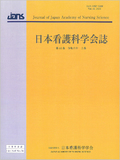Japanese
English
- 販売していません
- Abstract 文献概要
- 参考文献 Reference
要旨
目的:「間身体性」という概念を採用することによって,18トリソミー児(以下18T)の母親の語りから18T児自身の「主観」に接近していくことである.
方法:Merleau-Pontyの「間身体性」という概念を採用し現象学的研究方法を用いた.加えて,18T児自身の「QOL」を捉えるためにサルトルの概念を用いて説明を加えていった.
結果:一方的に与えられた「18T児の本質」は「QOL」低下させた.他方,18T児自身が「生きられる」ことを証明することによって「自らの本質」を掴み取り,「QOL」を高めていったが,社会的価値を引き受けることができなくなった時には,社会から撤退し最小値の「QOL」を生きていた.
結論:18T児の「QOL」は社会参加によって高められることがわかった.しかし,社会の価値によっては,社会からの撤退を余儀なくされ,18T児の「QOL」は最小値にまで低下することがわかった.
Objective: This study aimed to approach the subjective of children with trisomy 18 from the narratives of their mother by adopting Merleau-Ponty's concept of "intercorporeality".
Methods: The phenomenological research method employing Merleau-Ponty's concept of "intercorporeality" was used. Additionally, we used Sartre's concept to explain the quality of life(QOL) of children with trisomy 18.
Results: A child that was provided one-sided "the nature of a child with trisomy 18" reduced "quality of life". Conversely, the child proved that he was able to live, he was able to grasp the "nature of himself" and improved his QOL, if they were not able to accept the social values that they withdrew from society and lived a minimal QOL.
Conclusion: We found that the QOL of children with trisomy 18 could be enhanced by social participation, but depending on the social values, they were forced to withdraw from society and their QOL decreased to a minimum value.
Copyright © 2024, Japan Academy of Nursing Science. All rights reserved.


